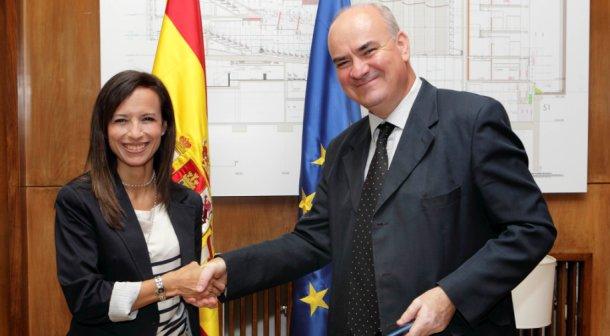Land Registry Certificates, or nota simples, can now be requested in English, which the Government hopes will encourage foreigners to invest in Spanish property.
The translated certificates will give the usual information contained in a nota simple, such as the vendor’s details, a description of the property, and the existence of any charges, embargoes or liens against it. See an example certificate in English.
The new facility was announced by Alfonso Candau, head of Spain’s College of Property Registrars (Colegio de Registradores), and Beatriz Corredor, Secretary of State for Housing, pictured above.
It will be run by specially-qualified English-speaking staff, and translated certificates can be requested online from https://buyingahouse.registradores.org/ for a cost of €29 plus VAT.
Spain’s Property Registry – similar to the UK’s Land Registry – records all deeds of sale that have been notarized and inscribed in the register (which can only be done once all taxes have been paid). The surest way to protect title to a property in Spain is to get it inscribed in the register, and buyers always need to check it before they commit to a property.
Corredor said it would make foreign buyers more confident by providing them with all the fiscal, legal and town planning information they need “in a way that is easier for them to understand.”
Giles Paxman, British Ambassador to Spain, also welcomed the new facility, plus other measures to protect property buyers introduced by the Spanish Government in a decree on 7 July.
“Communicating essential information in English, combined with the measures announced in the decree, should help to ensure buyers are accurately informed of any legal issues connected with a property,” said Paxman.
Unfortunately, the new measures do not solve the problems of the past, as Paxman points out.
“These measures will not, of course, do anything to help existing homeowners who have been experiencing issues with their properties. We will continue to work with the Spanish authorities to ensure these problems are addressed,” he said.
The new measures introduced in the 7 July decree (as summarised by the British Embassy in Spain) include:
- Allowing properties which are ‘fuera de ordenación’[1] to be registered on the Land Registry. The decree says this will protect owners who in many cases bought in good faith, while retaining the ‘fuera de ordenación’ status and the limitations this implies.
- Ensuring that essential information regarding the legality of the property is incorporated into the Land Registry. This means that when purchasers request a ‘nota simple’ from the Land Registry, they will be able to see whether there are or have been any legal proceedings against the property, such as proceedings which may result in fines or demolition. It will now be obligatory for town halls to provide registrars with this information. If town halls fail to provide this information, they will be held responsible for economic damages affecting third parties who bought in good faith.
- Confirming that it is impossible to acquire rights which contradict land and town planning laws due to administrative silence (this is also included in the Ley estatal de Suelo). This measure clarifies that a licence cannot be granted due to passivity or inaction by town halls. Instead, the transformation, construction and use of land requires administrative authorisation and if the timeframe for a response expires without the individual receiving authorisation, the lack of a response will be considered as a negative decision.
- Increasing protection for purchasers who buy off-plan from a developer. The decree states that it is not possible to register a new property on the Land Registry unless it has a licence of first occupation, a construction licence and a technical certificate which states that the property corresponds to the plans for which the licence was granted.



